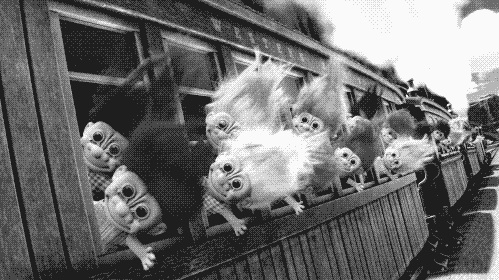Save 50% on a 3-month Digiday+ membership. Ends Dec 5.

It has been established that companies are people too. And like people, companies can sometimes be trolls.
While the term “patent troll” is usually reserved for entities formed with the express intent of going after other companies that infringe on patents, the definition has, in recent years, widened to include any company that unnecessarily spends time and money going after those infringing on its patents — especially if it’s a competitor.
The most recent offender is Lululemon, maker of overpriced yoga pants, tank tops and sports bras. The company has locked horns with Hanes and Calvin Klein over supposedly unique designs for apparel. Lululemon has reportedly given Hanes 15 days to stop making a tank top that resembles a patented Lululemon design. (It’s basically a tank top with a built-in sports bra.) Other products that are the subjects of patents are shorts with a built-in zipper and yoga mats. In response, Hanes is countersuing Lululemon, saying that the brand is trying to lay claim to an obvious design.
Here are three other serial offenders.
1-800-CONTACTS
A study from James Bessen and Michael Meuer, the authors of the 2008 book “Patent Failure,” found that patent trolls cost the economy $29 billion a year — costs usually associated with fighting patent suits. Ditto, a startup that lets users virtually try on glasses, can relate. The company claimed it was forced to launch an Indiegogo campaign to save itself from 1-800-CONTACTS, which it called a patent troll.
1-800-CONTACTS filed a lawsuit in Utah saying that Ditto copied its virtual-try-on technology. It had purchased the patent for the technology in 2012. The Electronic Frontier Foundation also wrote in support of Ditto, saying that 1-800-CONTACTS, while not a “classic” patent troll, was “little better.” In response, 1-800-CONTACTS said that the EFF was biased — three of its board members work for the same law firm representing Ditto.
Procter & Gamble
P&G, the world’s biggest advertiser and a company that reported $11.3 billion in profits last fiscal year, has long tried to protect itself from competitors by wielding patents as weapons.
Ad position: web_incontent_pos1
As far back as 2008, the company, which has over 40,000 patents, forced Johnson & Johnson to discontinue its Listerine-branded Whitening Strips. More recently, it has waged a larger tooth-whitening war to protect its Crest Whitening Strips, suing companies like Clio USA (which manufactured Target’s private-label teeth-whitening product) and Be Well marketing, which made the same for Walgreens. Recently, it sued Cao Group, which makes Sheer White strips for dentists to use. That case is ongoing.
But while lawyers for P&G have argued that the company spends a lot of money and time on developing innovative products and so should be able to defend them when needed, critics say that an approach like this dilutes the brand. One argument is that customers notice when store-brand products, which are much cheaper than P&G’s, are taken off the shelves. The effect of this on consumers is tangible.
Harry C. Alford, co-founder, president and CEO of the National Black Chamber of Commerce and a former P&G employee who has written about this issue, said that aggressive patent litigation by companies has a “negative impact on the consumer because it kills competition.” Certain brands are hurt more for appearing monopolistic. Others, depending on their image, may be a little more cushioned from the impact, because they may already be perceived to be cutthroat.
Apple
Apple is a well-known patent-litigation addict, suing almost every Android manufacturer, from HTC to Motorola to Samsung. When the Samsung litigation ended — with a whimper, not a bang — industry watchers agreed that Apple had won very little from mounting the lawsuits. What it lost was money, (in all, the companies spent $1 billion in fees) and image. Samsung has also managed to grab an increasing share of market.
Consumers aren’t stupid, and, increasingly, they realize that patent litigation is slowing down innovation overall, said Rob Meyerson, director of verbal identity at Interbrand San Francisco. “What we tell clients is to be consistent in intent,” he said. “These organizations need to act the same whether in the courtroom fighting patents or making ads on television.”
Ad position: web_incontent_pos2
More in Marketing

Ulta, Best Buy and Adidas dominate AI holiday shopping mentions
The brands that are seeing the biggest boost from this shift in consumer behavior are some of the biggest retailers.

U.K. retailer Boots leads brand efforts to invest in ad creative’s data layer
For media dollars to make an impact, brands need ad creative that actually hits. More CMOs are investing in pre- and post-flight measurement.
Ad position: web_bfu